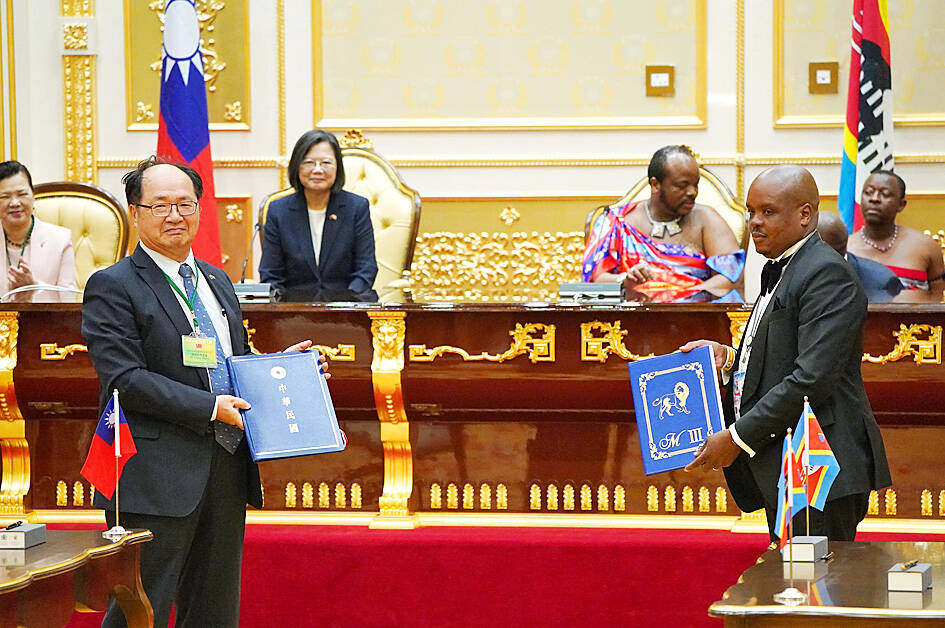Taiwan on Tuesday signed a memorandum of understanding to help the Kingdom of Eswatini, its only diplomatic ally in Africa, build an oil tank in the country.
Overseas Investment & Development Corp (OIDC, 海外投資開發股份有限公司) — a Taiwanese company focused on government aid projects overseas — has been contracted to build the strategic oil facility, Minister of Economic Affairs Wang Mei-hua (王美花) told reporters in Eswatini’s capital, Mbabane, after the memorandum of understanding was signed.
She did not go into detail, saying only that Eswatini had hoped to construct an oil tank that could store at least 30 days of oil reserves.

Photo: CNA
President Tsai Ing-wen (蔡英文), who is on a four-day visit to Eswatini, lauded the agreement as a milestone for relations between the two countries, the Presidential Office said in a news release.
Both sides have been in talks about the project for some time, she said during a meeting with Eswatini King Mswati III, adding that the planned facility would help ensure the African nation’s energy supply.
An Eswatini government Web site says the nation imports all of its oil from South Africa, leaving it susceptible to volatile international crude oil prices.
State oil company Eswatini National Petroleum Co (ENPC) has been mandated to build and operate oil reserve facilities as part of efforts to better ensure the nation’s oil supply.
Tuesday’s memorandum was signed by OIDC general manager Jeff Chung (鍾家富) and ENPC CEO Nhlanhla Dlamini.
OIDC was established in 1995 by state-run and private companies in Taiwan to undertake aid and infrastructure projects launched by the government in allied nations.
Officials at the ceremony also signed a deal to provide loans to female entrepreneurs in Eswatini and a sister-city agreement between Kaohsiung and Mbabane.
The financing agreement is part of a larger women’s empowerment project that Taiwan’s government launched in the African nation in 2020, Wang said.
As part of the project, the government has trained 5,000 Eswatini women in business and financial planning, she said.
Tsai also weighed in on the project, saying that she was glad that her government could fund the project and back women in Eswatini in the early phases of their businesses.
She also expressed hope that the sister-city agreement signed between Kaohsiung Mayor Chen Chi-mai (陳其邁) and Mbabane Mayor Vusi Tembe would facilitate more exchanges between the cities.
Chen told reporters after the ceremony that Kaohsiung was ready to share its experience with Mbabane in promoting information and communications technology, and facilitating the growth of small and medium-sized businesses.
Meanwhile, King Mswati III thanked Taiwan for continuing to support Eswatini’s development, adding that the three agreements marked an important step in the partnership between the two countries, the Presidential Office said.
The king, who has reigned over the last absolute monarchy in Africa since 1986, also encouraged more Taiwanese companies to invest in Eswatini, the office said.

Auckland rang in 2026 with a downtown fireworks display launched from New Zealand’s tallest structure, Sky Tower, making it the first major city to greet the new year at a celebration dampened by rain, while crowds in Taipei braved the elements to watch Taipei 101’s display. South Pacific countries are the first to bid farewell to 2025. Clocks struck midnight in Auckland, with a population of 1.7 million, 18 hours before the famous ball was to drop in New York’s Times Square. The five-minute display involved 3,500 fireworks launched from the 240m Sky Tower. Smaller community events were canceled across New Zealand’s

The Ministry of Foreign Affairs (MOFA) yesterday said it is closely monitoring developments in Venezuela, and would continue to cooperate with democratic allies and work together for regional and global security, stability, and prosperity. The remarks came after the US on Saturday launched a series of airstrikes in Venezuela and kidnapped Venezuelan President Nicolas Maduro, who was later flown to New York along with his wife. The pair face US charges related to drug trafficking and alleged cooperation with gangs designated as terrorist organizations. Maduro has denied the allegations. The ministry said that it is closely monitoring the political and economic situation

‘SLICING METHOD’: In the event of a blockade, the China Coast Guard would intercept Taiwanese ships while its navy would seek to deter foreign intervention China’s military drills around Taiwan this week signaled potential strategies to cut the nation off from energy supplies and foreign military assistance, a US think tank report said. The Chinese People’s Liberation Army (PLA) conducted what it called “Justice Mission 2025” exercises from Monday to Tuesday in five maritime zones and airspace around Taiwan, calling them a warning to “Taiwanese independence” forces. In a report released on Wednesday, the Institute for the Study of War said the exercises effectively simulated blocking shipping routes to major port cities, including Kaohsiung, Keelung and Hualien. Taiwan would be highly vulnerable under such a blockade, because it

UNRELENTING: China attempted cyberattacks on Taiwan’s critical infrastructure 2.63 million times per day last year, up from 1.23 million in 2023, the NSB said China’s cyberarmy has long engaged in cyberattacks against Taiwan’s critical infrastructure, employing diverse and evolving tactics, the National Security Bureau (NSB) said yesterday, adding that cyberattacks on critical energy infrastructure last year increased 10-fold compared with the previous year. The NSB yesterday released a report titled Analysis on China’s Cyber Threats to Taiwan’s Critical Infrastructure in 2025, outlining the number of cyberattacks, major tactics and hacker groups. Taiwan’s national intelligence community identified a large number of cybersecurity incidents last year, the bureau said in a statement. China’s cyberarmy last year launched an average of 2.63 million intrusion attempts per day targeting Taiwan’s critical